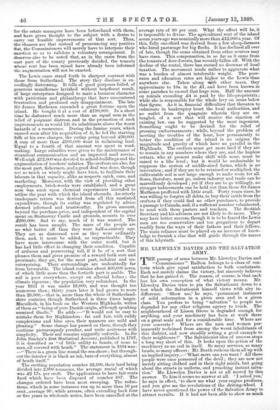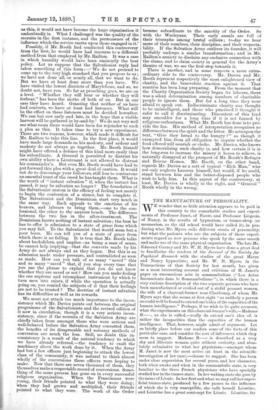MR LLEWELYN DAVIES AND THE SALVATION AEMY.
TUEpassage of arms between Mr. Ilewelyn Davies and " Commissioner " Railton belongs to a class of con- tests which give equal satisfaction to both combatants. Each not merely claims the victory, but sincerely believes that he has gained it. The reason, of course, is that each has his own conception of what victory means. Mr. Llewelyn Davies tries to pin the Salvationist down to a test which the Salvationist himself views with airy in- difference. Show me,' he says, permanent instances of solid reformation in a given area and in a given class. You profess to bring " salvation " to people too degraded for any other religious agency to touch. The neighbourhood of Lisson Grove is degraded enough for - anything, and your machinery has been at work there on a great scale and for a considerable time. Where are your converts ? Where are the men and women per- manently reclaimed. from among the worst inhabitants of this district, and now steadily setting a good example to their neighbours ?' The Salvationist idea of success stops a long way short of this. It looks upon the action of the machinery as an end in itself. So many services, so many bands, so many officers : Mr. Booth reckons them all up with an implied inquiry,—' What more can you want ? All these people were once possessed of the devil ; they are now not merely sitting clothed and in their right minds, but going about the streets in uniform, and preaching instant salva- tion.' Mr. Llewelyn Davies is not at all moved by this answer. To him it seems no answer at all. I asked you,' he says in effect, to show me what your engine produces, and you give me the revolutions of the driving-wheel. I have never questioned the power of the Salvation Army to attract recruits. If it had not been able to show as much as this, it would net have become the huge organisation it undoubtedly is. What I challenged was the quality of the recruits in the first instance, and the permanence of the influence which the service exerts upon those engaged in it.' Possibly, if. Mr. Booth had conducted this controversy from the first, he would, have had recourse to a different method from that employed by Mr. Railton. It was a case in which humility would. have been eminently the best policy. Let us- suppose that the Salvationist reply had taken something of this form We do not pretend to come up to the very high standard that you propose to us ; we have not done all, or nearly all, that we want to do. But we have at least done more than you have. We have visited the lowest districts of Marylebone, and so, we doubt not, have you. So far as preaching goes, we are on a level. "Whether they will hear or whether they will forbear," has been the motto (if both of us. But in our case they have heard. Granting that neither of us have had converts, we have at least had listeners. What will be the effect on these listeners must be decided hereafter. We can but sow early and late, in the hope that a visible harvest will be gathered in by-and-by.' We do not very well see what room there would have been for rejoinder to such a plea, as this. It takes time to try a new experiment. There are two reasons, however, which made it difficult for Mr. Railton to take this line. In the first place, it would have made large demands on his modesty, and ardour and modesty do not always go together. Mr. Booth himself might have offered a defence of this kind more easily than his subordinate. A General is permitted to distrust his own ability where a Lieutenant is not allowed to distrust his commander's. But even Mr. Booth would have had to put forward this plea with a great deal of caution. It would not do to discourage your followers, still less to contravene an essential tenet of the creed he has taught them. What is the worth of "instant salvation" if, when the instant has passed, it may be salvation no longer ? The foundation of the Salvationist system is the efficacy of feeling not merely to begin the conversion of a sinner, but to complete it. The Salvationist and the Dominican start very much in the same way. Each appeals to the emotions of his hearers, and labours to bring them,—one to the con- fessional, the other to the anxious bench. The difference between the two lies in the after-treatment. The Dominican knows nothing of instant salvation; the best he has to offer is admission to a state of grace from which you may fall. To the Salvationist that would seem but a poor boon. He can tell you of a state of grace from which there is no falling. It is true that Mr. Booth talks about backsliders, and implies—as being a man of sense, he cannot help implying—that the converts made by his Army do not always end as they began. But this is an admission made under pressure, and contradicted as soon as made. How can you talk of so many " saved " this and so many " saved " that, if you stop every time that you use the phrase to explain that you do not know whether they are saved or not ? How can you make feeling the one supreme and triumphant instrument by which to turn men into saints, if while the operation is actually going on, you remind the subjects of it that their feelings are not to be trusted ? The doctrine of instant salvation has its difficulties as well as its rewards.
We must not attach too much importance to the incon- sistency which Mr. Davies points out between the original programme of the Salvationists and the revised edition of it now in circulation, though it is a very serious incon- sistency, since if the recruits of the Salvation Army are chiefly taken from amongst those who were serious and well-behaved before the Salvation Army converted them, the benefits of its disagreeable and screamy methods of conversion are much the less. Still, no doubt this in- consistency is a result of the natural tendency to which we have already referred,—the tendency to exalt the machinery above the work done by it. When the Army had but a few officers just beginning to attack the lowest class of the community, it was natural to think almost wholly of the conversions these officers were hoping to make. Now that there are seven thousand of them, they themselves make a respectable record of conversions. Some- thing of the same process has gone on in every successful religious organisation. When the Franciscans were young, their friends pointed to what they were doing ; when they had grown and multiplied, their friends pointed to what they were. The work of the Order became subordinate to the sanctity of the Order. So with the Wesleyans. Their early annals are full of their triumphs among brutal colliers ; to-day we hear more of their numbers, their discipline, and their respecta- bility. If the Salvation Army outlives its founder, it will probably undergo a similar transformation ; and in Mr. Railton's anxiety to disclaim any exclusive connection with the slums, and to claim society in general for the Army's theatre of war, we see the first step towards it.
There is another, and in some respects a more extra- ordinary side to the controversy. Mr. Davies and Mr. Booth represent respectively the most enlightened view of charity, and, the benevolent reaction against it. That reaction has been long preparing. From the moment that the Charity Organisation Society began its labours, there was a silent determination among numbers of charitable people to ignore them. But for a long time they were afraid to speak out. Indiscriminate charity was thought to be unintelligent, and those who practised it thought it safer to call it discriminating. Discontent of this kind may smoulder for a long time if it is not fanned by religious enthusiasm. What Mr. Booth has done is to pro- vide the fan. His method of interpretation recognises no difference between the spirit and the letter. He acts upon the text, "Give they bread to the hungry ?" as though it exempted him from all obligation to inquire whether the food offered will nourish or choke. Mr. Davies, who knows how demoralising such charity is, and how certain it is in the long-run to increase the misery it hopes to relieve, is naturally dismayed at the prospect of Mr. Booth's Refuges and Rescue Homes. Mr. Booth, on the other hand, regards Mr. Davies as a sort of typical "Rich Man," who not only neglects Lazarus himself, but would, if he could, stand between him and the better-disposed people who wish to help him. In this aspect of the controversy, at least, Mr. Davies is wholly in the right, and " General " Booth wholly in the wrong.







































 Previous page
Previous page